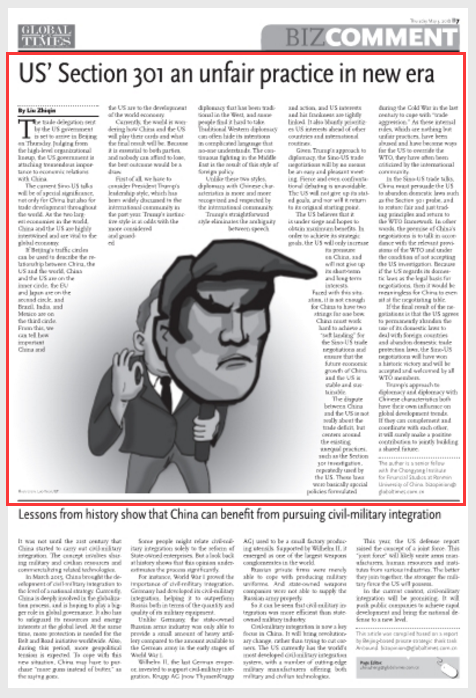Major Power Relations
Your Present Location: PROGRAMS> Major Power RelationsLiu Zhiqin: China must persuade US to abandon unfair 301 probe at talks
By Liu Zhiqin Source: Global Times Published: 2018-5-3
The trade delegation sent by the US government is set to arrive in Beijing on Thursday. Judging from the high-level organizational lineup, the US government is attaching tremendous importance to economic relations with China.

The current Sino-US talks will be of special significance, not only for China but also for trade development throughout the world. As the two largest economies in the world, China and the US are highly intertwined and are vital to the global economy.
If Beijing`s traffic circles can be used to describe the relationship between China, the US and the world, China and the US are on the inner circle, the EU and Japan are on the second circle, and Brazil, India, and Mexico are on the third circle. From this, we can tell how important China and the US are to the development of the world economy.
Currently, the world is wondering how China and the US will play their cards and what the final result will be. Because it is essential to both parties, and nobody can afford to lose, the best outcome would be a draw.
First of all, we have to consider President Trump`s leadership style, which has been widely discussed in the international community in the past year. Trump`s instinctive style is at odds with the more considered and guarded diplomacy that has been traditional in the West, and some people find it hard to take. Traditional Western diplomacy can often hide its intentions in complicated language that no-one understands. The continuous fighting in the Middle East is the result of this style of foreign policy.
Unlike these two styles, diplomacy with Chinese characteristics is more and more recognized and respected by the international community.
Trump`s straightforward style eliminates the ambiguity between speech and action, and US interests and his frankness are tightly linked. It also bluntly prioritizes US interests ahead of other countries and international routines.
Given Trump`s approach to diplomacy, the Sino-US trade negotiations will by no means be an easy and pleasant meeting. Fierce and even confrontational debating is unavoidable. The US will not give up its stated goals, and nor will it return to its original starting point.
The US believes that it is under siege and hopes to obtain maximum benefits. In order to achieve its strategic goals, the US will only increase its pressure on China, and will not give up its short-term and long-term interests.
Faced with this situation, it is not enough for China to have two strings for one bow. China must work hard to achieve a "soft landing" for the Sino-US trade negotiations and ensure that the future economic growth of China and the US is stable and sustainable.
The dispute between China and the US is not really about the trade deficit, but centers around the existing unequal practices, such as the Section 301 investigation, repeatedly used by the US. These laws were basically special policies formulated during the Cold War in the last century to cope with "trade aggression." As these internal rules, which are nothing but unfair practices, have been abused and have become ways for the US to override the WTO, they have often been criticized by the international community.
In the Sino-US trade talks, China must persuade the US to abandon domestic laws such as the Section 301 probe, and to restore fair and just trading principles and return to the WTO framework. In other words, the premise of China`s negotiations is to talk in accordance with the relevant provisions of the WTO and under the condition of not accepting the US investigation. Because if the US regards its domestic laws as the legal basis for negotiations, then it would be meaningless for China to even sit at the negotiating table.
If the final result of the negotiations is that the US agrees to permanently abandon the use of its domestic laws to deal with foreign countries and abandon domestic trade protection laws, the Sino-US negotiations will have won a historic victory and will be accepted and welcomed by all WTO members.
Trump`s approach to diplomacy and diplomacy with Chinese characteristics both have their own influence on global development trends. If they can complement and coordinate with each other, it will surely make a positive contribution to jointly building a shared future.
The author is a senior fellow with the Chongyang Institute for Financial Studies at Renmin University of China.
Key Words: China; US; 301; Liu Zhiqin























































































 京公网安备 11010802037854号
京公网安备 11010802037854号





